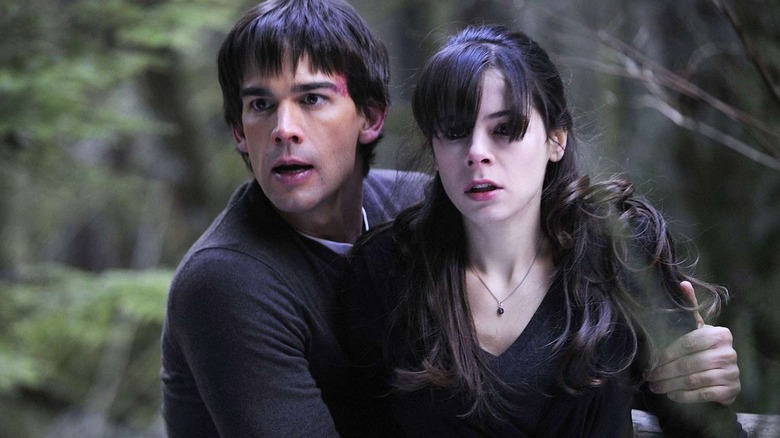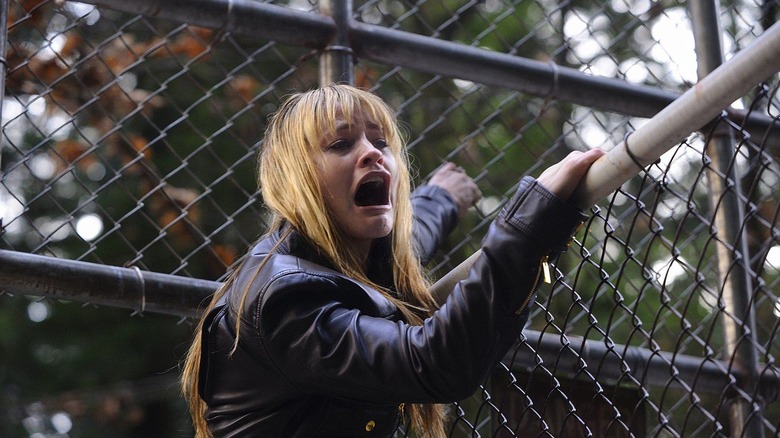15 Years Ago, The Best Horror Miniseries You've Never Seen Premiered On CBS
This post contains spoilers for "Harper's Island."
The horror anthology model is pretty commonplace in our current landscape, its core appeal lying in shifting tones and narrative motivations, along with a ton of variety to offer. Anthologies are not a brand-new phenomenon, as their enduring popularity can be traced back to shows like "Alfred Hitchcock Presents" or Rod Serling's "Twilight Zone" series, proving that even the earliest days of network television held space for such a format — on the condition that the show could sustain good ratings. When "Harper's Island" premiered on CBS in April 2009, it was marketed as a horror/slasher series that would go on to follow the anthology format in the second season, replete with new characters and a fresh setting. Unfortunately, these plans did not come to pass, as the 13-part limited event received dwindling ratings as the episodes progressed — with a season-wide average of 4.8 million — leading to its eventual cancellation.
Anytime a series is not given the chance to reach its potential or reinvent itself, a sliver of hope is blotted out from this world ... just kidding! While nothing quite as dramatic happens, it still thwarts good stories from being continued or improved upon, especially when it comes to a horror series that wasn't scared to kill off at least one character every episode. The episodes were paced and structured in near-perfect ways to evoke tension and intrigue, where every character emerged as a potential suspect unless they were unceremoniously killed off when you least expected it. Well, except Abby Mills (Elaine Cassidy), our primary protagonist, but there were still enough twists and red herrings to keep things interesting, given the microcosmic scope of the setting, as all the murders occurred on the titular island.
While it is tempting to think that "Harper's Island" might have benefited from the streaming model treatment if it were released today, too many great shows get canceled after a single season (despite enjoying excellent ratings) for this to be an unblemished sentiment. Conversely, the series could have potentially fared well today in terms of viral marketability, as the weekly whodunnit aspect might have contributed massively to social media theory-crafting. Anyway, let's have a look at the show's many strengths, and what makes it so special.
Harper's Island knew how to sleuth, shock, and entertain
A serial killer, John Wakefield, murdered six people on Harper's Island in 2003, with Abby's mother being one of the victims. Severely traumatized by the incident and the memory of the island in itself, Abby moves away, only to return seven years later for a wedding. However, trouble is already brewing: the folks aboard the ferry on the way to the island are unaware that the bride's cousin, Ben (Clint Carleton), has been tied to and dismembered on the ferry's propeller (!), one of the guests secretly has an inordinate sum of money and a gun on their person, and the bride's ex covertly arrives with the intention to break off the marriage. One would think that things could not get more ominous, but they do, as the groom's uncle, Marty (Harry Hamlin), falls to his death after someone cuts a footbridge in half, making it very clear that a killer is on the loose.
The kills were often inventive and gory, constantly pushing the boundaries of what was expected from a CBS show that aired on Sundays — I mean, at one point, a head spade fixed atop a chandelier drops down and pierces a character's skull in a public setting, and plunges the island in chaos. There are "Saw"-esque traps employed at certain junctures, leading to extremely bloody outcomes, and these deaths never feel predictable, as every character is fleshed out with equal care and nuance, making it difficult to mark anyone as "expendable." There are clues strewn across the episodes that help piece the puzzle together, but these reveals are measured enough to not be too blatant or obtuse, keeping the whodunnit guessing game alive every week when it aired.
After a point, it becomes clear that the murders are about Abby, and that her connection to the island is a seminal part of the killer's motivations, adding even more layers of trauma to her headspace, with the island already being submerged in grief and completely cut off from the rest of the world. Even when violent murders are not taking place, the interpersonal dynamics among the islanders are decidedly dramatic: secret liaisons, messy affairs, and unsavory secrets make it easier to point fingers and shift blame, creating the perfect opportunity for the killer to move around, unscathed. Well, until they are unmasked, of course.
Only a select few make it out alive in "Harper's Island" — an experience that is meant to be savored and relished — as few horror anthologies have concluded on such a flawlessly bleak, cathartic note.

